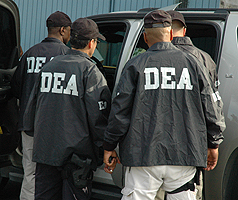Fentanyl is an American Foreign Policy Issue
Madi Field and Jonathan Ware
Staff Writers
In 2022, fentanyl killed 70,000 people in America. The drug’s overdose death toll per week, the Drug Enforcement Agency reports, is the equivalent of an entire Seton Hall graduating class.
Fentanyl, contrary to popular belief, is not just a domestic issue but a foreign policy one. According to the National Institute on Drug Abuse, fentanyl is a dual-use synthetic opiate that produces a highly addictive, intensely euphoric feeling irreplicable by other drugs. Small amounts of fentanyl, particularly for first-time users, can be deadly, and the DEA alleges a potentially deadly dose of fentanyl can fit on the tip of a pencil.
The scope and speed of the fentanyl epidemic, nearly unheard of a decade ago, has shocked officials; more than two-thirds of drug overdoses reported in 2022 were fentanyl-related. Last year, the DEA seized enough fentanyl to kill every single American, and sixty percent of all illegal pills tested in DEA labs tested positive for deadly doses of fentanyl.
Fentanyl’s production, according to the Brookings Institute, can be sourced to Chinese criminal syndicates, which manufacture and smuggle fentanyl’s chemical components into Mexico and sell them to cartels. These Chinese gangs, which have recently deepened their ties to Mexico, are able to operate unbothered by Beijing as they promote the government’s political, social, and economic interests.
Once the narcotics arrive in Mexico, cartels (namely the Sinaloa and Jalisco Cartels) cut and press the fentanyl, assembling them into counterfeit opiates, which can then pass for legitimate prescription drugs. According to the Cato Institute, these cartels hire American citizens to smuggle drugs across crowded southern ports.
Colorado’s 17th Judicial District Attorney’s Office, reports that fentanyl is particularly attractive to cartels because it is cheap to manufacture, difficult to differentiate its high when mixed, and easy to smuggle because lower doses produce euphoric highs. The profit yielded from its sale offsets the loss of thousands of users from overdoses.
Finding a solution to fentanyl production and trafficking is a pressing national security issue. While Biden has made the opioid epidemic a fixture of his presidency, the administration has neglected to properly address its root cause: the illegal manufacturing of its components by Chinese gangs and its trafficking into the U.S. by Mexican cartels. Fentanyl trafficking, fundamentally, is a foreign policy issue.
Bilateral cooperation with China is difficult, and the Brookings Institute writes that there has been minimal cooperation between the United States and China regarding fentanyl and product trafficking. While China has ramped up its domestic and Southeast Asian counternarcotic operations, Beijing’s ties to the Chinese mob and lack of strategic or cultural interest in helping the United States combat fentanyl makes it unwilling to participate in bilateral cooperation. Beijing has repeatedly refused to engage with the U.S., blaming American culture instead. Inflaming tensions further is unproductive.
Cooperation with Mexico has proven more fruitful. The Congressional Research Service writes that Mexican President Obrador has pursued extensive counter narcotics operations, using the Mexican Army and Navy to seize product, control ports and airports, and raid processing facilities. On several occasions, the DEA has worked with the Mexican Navy to apprehend traffickers in the Gulf of Mexico, and a few years ago the US-Mexico High-Level Security Dialogue was formed to discuss drug policy and enhance future cooperation. However, US-Mexican cooperation has faltered since 2020, according to Congressman David Trone, when a top Mexican official was arrested on a drug conspiracy charge. The key then lies in creating policy that stops the flow of drugs from the source. Cutting the illegal chemical supply chains between China and Mexico appears to be the most fruitful plan of action.
This entails enhancing US-Mexico cooperation in states that house major seaports and increasing oversight and security funding. Practically, this means encouraging the Mexican government to allocate thousands more soldiers to staff ports and airports and enhancing end-destination documentation of goods. Given Mexican governmental corruption, the DEA and American government should offer their training and documentation services to better train investigators, disincentivize corruption, and improve counternarcotic bureaucracy. It is also important that America reaffirms Mexican sovereignty and refrains from charging Mexican officials on drug-related crimes; the enhanced cooperation of our neighbor is far more valuable than prosecution.
While undertaking these actions would admittedly be expensive, the social and economic toll that fentanyl takes on the United States is far more costly. While the War on Drugs has been deeply flawed, fentanyl is a deadly drug that poses unparalleled danger to the wellbeing of Americans. Treating fentanyl as a foreign policy issue by undertaking measured, cooperative policy with Mexican officials allows America to bypass sources of tension with Beijing, saving American lives.
Image Courtesy of Drug Enforcement Agency



